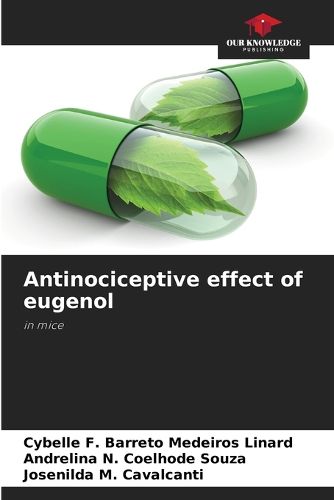Readings Newsletter
Become a Readings Member to make your shopping experience even easier.
Sign in or sign up for free!
You’re not far away from qualifying for FREE standard shipping within Australia
You’ve qualified for FREE standard shipping within Australia
The cart is loading…






This title is printed to order. This book may have been self-published. If so, we cannot guarantee the quality of the content. In the main most books will have gone through the editing process however some may not. We therefore suggest that you be aware of this before ordering this book. If in doubt check either the author or publisher’s details as we are unable to accept any returns unless they are faulty. Please contact us if you have any questions.
We investigated the effect of eugenol, capsaicin and lidocaine on the formalin test in mice. Eugenol, a phenolic derivative, chemically designated as 4-allyl-2-methoxy-phenol, commonly known as clove essence, as it is present in large quantities in the essential oil of cloves (Eugenia aromatica), at doses of 0.01; 0.1; 0.3; 1; 3 and 10 microg/site, administered intraplantarly, did not promote an increase in nociception compared to the control in the first phase of the test. In the formalin test, eugenol reduced nociception by 70.69% at a dose of 0.1 microg/site, suggesting its effect on pain of neurogenic origin by reversibly inhibiting nerve activity. Pre-treatment with capsazepine and a test to destroy afferent C fibers confirmed the action of eugenol on TRPV1 receptors, as eugenol did not reduce the nociception caused by formalin in either test. We conclude that eugenol in small doses does not increase nociception; it has a local antinociceptive effect, probably due to its inhibitory action on TRPV1 receptors; eugenol, capsaicin and lidocaine have a local antinociceptive effect in the first phase of the formalin test.
$9.00 standard shipping within Australia
FREE standard shipping within Australia for orders over $100.00
Express & International shipping calculated at checkout
This title is printed to order. This book may have been self-published. If so, we cannot guarantee the quality of the content. In the main most books will have gone through the editing process however some may not. We therefore suggest that you be aware of this before ordering this book. If in doubt check either the author or publisher’s details as we are unable to accept any returns unless they are faulty. Please contact us if you have any questions.
We investigated the effect of eugenol, capsaicin and lidocaine on the formalin test in mice. Eugenol, a phenolic derivative, chemically designated as 4-allyl-2-methoxy-phenol, commonly known as clove essence, as it is present in large quantities in the essential oil of cloves (Eugenia aromatica), at doses of 0.01; 0.1; 0.3; 1; 3 and 10 microg/site, administered intraplantarly, did not promote an increase in nociception compared to the control in the first phase of the test. In the formalin test, eugenol reduced nociception by 70.69% at a dose of 0.1 microg/site, suggesting its effect on pain of neurogenic origin by reversibly inhibiting nerve activity. Pre-treatment with capsazepine and a test to destroy afferent C fibers confirmed the action of eugenol on TRPV1 receptors, as eugenol did not reduce the nociception caused by formalin in either test. We conclude that eugenol in small doses does not increase nociception; it has a local antinociceptive effect, probably due to its inhibitory action on TRPV1 receptors; eugenol, capsaicin and lidocaine have a local antinociceptive effect in the first phase of the formalin test.